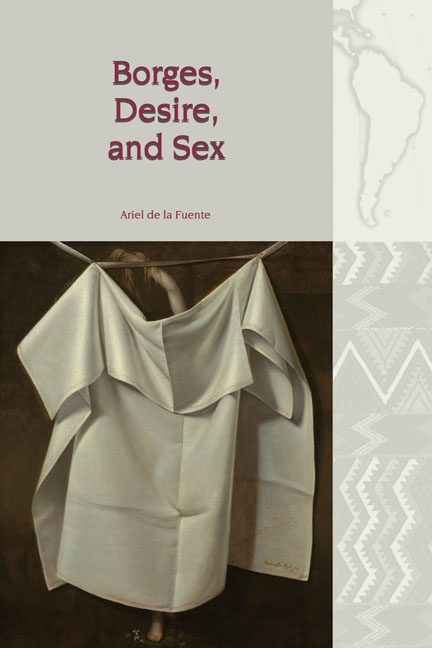Book contents
- Frontmatter
- Dedication
- Contents
- Acknowledgements
- List of Abbreviations
- Introduction
- 1 On Borges’s Sexuality
- 2 Biography in Literature and the Reading of Desire and Sex in Borges
- 3 Borges’s Erotic Library: The Poetry Shelf
- 4 Sir Richard Burton’s Orientalist Erotica: The Thousand Nights and a Night and The Perfumed Garden
- 5 Schopenhauer and Montaigne, Philosophy and Sex
- 6 Desire and Sex in Buenos Aires: Borges’s Poetry on the Arrabal
- 7 Stoicism and Borges’s Writing of Women
- 8 “Emma Zunz”: Sex, Virtue, and Punishment
- 9 “La intrusa”: Incest and Gay Readings
- Conclusions
- Works Cited
- Index
5 - Schopenhauer and Montaigne, Philosophy and Sex
- Frontmatter
- Dedication
- Contents
- Acknowledgements
- List of Abbreviations
- Introduction
- 1 On Borges’s Sexuality
- 2 Biography in Literature and the Reading of Desire and Sex in Borges
- 3 Borges’s Erotic Library: The Poetry Shelf
- 4 Sir Richard Burton’s Orientalist Erotica: The Thousand Nights and a Night and The Perfumed Garden
- 5 Schopenhauer and Montaigne, Philosophy and Sex
- 6 Desire and Sex in Buenos Aires: Borges’s Poetry on the Arrabal
- 7 Stoicism and Borges’s Writing of Women
- 8 “Emma Zunz”: Sex, Virtue, and Punishment
- 9 “La intrusa”: Incest and Gay Readings
- Conclusions
- Works Cited
- Index
Summary
Borges's erotic library included philosophy as well. His most important reading in this respect was the work of Arthur Schopenhauer, who had made sexuality one of the cornerstones of his metaphysics. But beyond the specific insight on desire and sex that Schopenhauer's work contained, it also showed Borges the opportunities that the discipline of philosophy presented to reflect on the subject and offered a model for writing texts that moved between metaphysics and the erotic. These philosophical reflections, I propose, became another discreet location from which Borges spoke about desire and sex, as were also the footnotes or short biographies of authors discussed earlier.
In this chapter I will consider first the presence of Schopenhauer's work in the short story “La secta del Fénix,” and later I will explore the essay “Historia de la eternidad” (1936). In the case of the latter, I will begin by looking at how in his speculation about eternity and time, Borges blended erotic materials and sexual preoccupations; then, I will investigate the continuities between the reflections about time presented in the essay and some of his poems on sex; and finally, we will read a footnote in the essay in which Borges speculates about the workings of desire. Although it is clear that Schopenhauer was the most important author in this section of Borges's erotic library, this chapter will also allow us to see how he integrated other readings, such as Michel de Montaigne's Les Essais and, once again, Burton's Nights, in his philosophical explorations.
Schopenhauer in “La secta del Fénix”
The importance of Schopenhauer (1788–1860) among Borges's readings can hardly be overstated. He considered the German philosopher “la autoridad máxima” in metaphysics, and, not coincidentally, Borges frequently cites him throughout his work. Yet, for all its importance, the relationship between Schopenhauer's work and Borges's literature has rarely been discussed systematically. In addition, even those who have recognized the importance of this intellectual influence have overlooked the centrality of sex in the German's philosophy: as an example, while the editors of the critical edition of the Obras completas use two pages to explain the presence of Schopenhauer in Borges's work, they completely ignore the fundamental role that the former accorded to sexuality in his system.
- Type
- Chapter
- Information
- Borges, Desire, and Sex , pp. 109 - 128Publisher: Liverpool University PressPrint publication year: 2018



